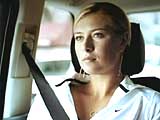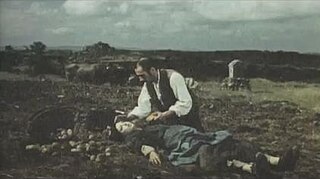Related Research Articles
Advertising in video games is the integration of advertising into video games to promote products, organizations, or viewpoints.

Got Milk? is an American advertising campaign on television and YouTube encouraging the consumption of milk and dairy products. Created by the advertising agency Goodby Silverstein & Partners for the California Milk Processor Board in 1993, it was later licensed for use by milk processors and dairy farmers. It was launched in 1993 by the "Aaron Burr" television commercial, directed by Michael Bay. The national campaign, run by MilkPEP began to add the "got milk?" logo to its "Milk Mustache" ads in 1995.
Switchers was an advertising campaign launched by Apple Computer on June 10, 2002. It featured what the company referred to as "real people" who had "switched" from the Microsoft Windows platform to the Mac. An international television and print ad campaign directed users to a website where various "myths" about the Mac platform were "dispelled". The television commercials were directed by Errol Morris.

Bartle Bogle Hegarty (BBH) is a British global advertising agency. Founded in 1982 by British ad men John Bartle, Nigel Bogle, and John Hegarty, BBH has offices in London, New York City, Singapore, Shanghai, Mumbai, Stockholm and Los Angeles and employs more than 1,000 staff worldwide. The company is part of international agency group Publicis. In 2018 BBH was named the IPA Effectiveness Company of the Year.
Apple Inc. has had many notable advertisements since the 1980s. The "1984" Super Bowl commercial introduced the original Macintosh mimicking imagery from George Orwell's 1984. The 1990s Think Different campaign linked Apple to famous social figures such as John Lennon and Mahatma Gandhi, while also introducing "Think Different" as a new slogan for the company. Other popular advertising campaigns include the 2000s "iPod People", the 2002 Switch campaign, and most recently the Get a Mac campaign which ran from 2006 to 2009.

The first-person shooter video game Halo 3 was the focus of an extensive marketing campaign which began with the game's developer, Bungie, announcing the game via a trailer at the Electronic Entertainment Expo in May 2006. Microsoft, the game's publisher, planned a five-pronged marketing strategy to maximize sales and to appeal to casual and hard-core gamers. Bungie produced trailers and video documentaries to promote the game, partnering with firms such as Digital Domain and Weta Workshop. Licensed products including action figures, toys, and Halo 3-branded soda were released in anticipation of the game; the franchise utilized more than forty licensees to promote the game, and the advertising campaign ultimately cost more than $40 million.

The Advertising Standards Authority (ASA) is the self-regulatory organisation of the advertising industry in the United Kingdom. The ASA is a non-statutory organisation and so cannot interpret or enforce legislation. However, its code of advertising practice broadly reflects legislation in many instances. The ASA is not funded by the British government, but by a levy on the advertising industry.
Reassuringly Expensive was the advertising slogan for Stella Artois in the United Kingdom from 1982 until 2007. The 1990s UK television advertising campaigns became known for their distinctive style of imitating European cinema and their leitmotif taken from the score of Jean de Florette, inspired, in turn, by Giuseppe Verdi's La forza del destino. The TV campaigns began in 1991 with a series of adverts based on Jean de Florette, directed by the British duo Anthea Benton and Vaughan Arnell, moving on to other genres including war movies, silent comedy and even surrealism. They have used notable movie directors such as Jonathan Glazer, and their aim was to portray the drink in a context of sophisticated European culture.

Pretty is a television advertisement launched in 2006 by Nike, Inc. to promote its "Nike Women" brand of sportswear. The 60-second spot was handled by advertising agency Wieden+Kennedy in Portland, Oregon. The advert stars Russian tennis player Maria Sharapova in her first appearance as a spokesperson for the brand. Pretty debuted on U.S. television on August 20, 2006, with later appearances in cinemas and in print advertisements. It was directed by Czech director Ivan Zachariáš, with post-production and VFX work by The Mill.

Good Doctor is a television and cinema advertisement released in 2002 by Interbrew to promote its Stella Artois brand of lager within the United Kingdom. The 100-second spot was produced by advertising agency Lowe Lintas & Partners in London. Good Doctor premiered on British television in January 2002, with later appearances in cinemas. It is the seventh piece in the Jean de Florette-inspired "Reassuringly Expensive" series that had been running since 1992. The advert was directed by Czech director Ivan Zacharias with help from the production company Stink and post-production work by The Moving Picture Company. The commercial was a popular, financial, and critical success, boosting sales during the period in which it ran, and receiving more awards than any other campaign in 2002, including a Cannes Gold Lion, an Epica Award and several prizes from the D&AD Awards.
Mountain is a 2003 television and cinema advertisement launched by Sony Corporation to promote the PlayStation 2 video game console. The budget for production and advertising space purchases for the 60-second piece amounted to £5m across all markets. The commercial depicts a Brazilian crowd congregating to form a mountain of human bodies, all competing to reach the top of the pile. The campaign surrounding Mountain was handled by advertising agency TBWA London. The commercial was directed by Frank Budgen. Production was contracted to Gorgeous Enterprises, with post-production by The Mill. Mountain premiered in 30 countries on 13 November 2003.

The Life, also known as We Are ODST, is a television and cinema advertisement launched in 2009 by Microsoft to promote the first-person shooter Halo 3: ODST in the United States. The 150-second piece follows a young soldier through enlistment, training, and battle as an Orbital Drop Shock Trooper (ODST), analogous to a paratrooper that drops from space to a battlefield. The Life was created by advertising agency T.A.G., an offshoot of McCann Erickson. Production of the commercial itself was handled by production company Morton/Jankel/Zander (MJZ). It was directed by Rupert Sanders, and post-production was conducted by Asylum. It was filmed in Hungary, just outside Budapest in a coal mine and abandoned factories to give the sequence an "Eastern Bloc" aesthetic. The commercial and its associated campaign proved hugely successful; on the week of its launch, Halo 3: ODST became the top-selling game for the Xbox 360 worldwide, and over 2.5 million copies were sold within the first few weeks of release. The Life went on to win a number of honours from the advertising and entertainment industries, including two Clio Awards, a London International Advertising Award and several honours from the Cannes Lions International Advertising Festival, the most prestigious awards ceremony in the advertising industry.

Time Sculpture is a British television and cinema advertisement launched in 2008 to promote Toshiba's high-definition television upscaling technology. The piece, which comprised a collection of interacting loops sequenced into a moving shot, was created in collaboration with advertising agency Grey London, based on a video art proposal by director Mitch Stratten. Time Sculpture holds the world record for the greatest number of moving image cameras used in a single shot.

Tag is a television and cinema advertisement launched by Nike Inc. in 2001 to promote its line of sportswear in the United States. It was one of four pieces forming the television component of the $25m "Play" campaign, which had been running for several months. Tag was created by advertising agency Wieden+Kennedy. Production was handled by production company Gorgeous Enterprises, who assigned director Frank Budgen to oversee the project. Filming took place in Toronto, Ontario.
Clay Weiner is an American director and writer of commercials, film and television.
Karmarama is an advertising agency based in London and founded in 2000.
"Aaron Burr" is a television advertisement for milk, created in 1993. Directed by Michael Bay and starring Sean Whalen, it was the first commercial in the "Got Milk?" advertising campaign. The ad depicts a history buff, portrayed by Whalen, who is unable to audibly voice the answer of a $10,000 radio contest question because he runs out of milk to wash out the peanut butter sandwich stuck in his mouth. Its title refers to the American politician of the same name, the answer to the question.

The Screen Actors Guild - American Federation of Television and Radio Artists is an American labor union formed in 2012 by the merger of the Screen Actors Guild and the American Federation of Television and Radio Artists. It represents approximately 160,000 media professionals worldwide. SAG-AFTRA is a member of the AFL-CIO, the largest federation of unions in the United States. SAG-AFTRA is also a member of the International Federation of Actors.
A launderette (laundromat) is a self-service laundry facility.
References
- ↑ "Play More". Archived from the original on 23 August 2002. Retrieved 24 April 2017.
- ↑ Mills, Dominic (12 March 2002). "Game on as Gates joins console wars". The Daily Telegraph . Retrieved 24 April 2017.
- 1 2 3 Sweney, Mark (8 May 2002). "CAMPAIGN OF THE WEEK: Microsoft promoted the European launch of its Xbox console with games and ad previews on a dedicated web site, writes Mark Sweney" . Retrieved 24 April 2017.
- ↑ Bramwell, Tom (24 January 2002). "European Xbox advertising kicks off". Eurogamer. Retrieved 24 April 2017.
- ↑ Cozens, Claire (20 February 2002). "How did they do that?". The Guardian. Retrieved 24 April 2017.
- 1 2 Milmo, Cahal (6 June 2002). "Xbox's advert pulled after protest from TV watchdog". The Independent . Retrieved 24 April 2017.
- 1 2 3 "'Shocking' Xbox advert banned". news.bbc.co.uk. 6 June 2002. Retrieved 24 April 2017.
- ↑ Richardson, Tim (5 June 2002). "ITC bans 'offensive' Xbox TV ad". The Register . Retrieved 24 April 2017.
- ↑ Frith, David (1 July 2002). "Cough up, ACS tells Govt". The Canberra Times . p. 14.
Britain's Independent Television Commission called the ad 'shocking' and banned it from being shown on television, although it is still being run in movie theatres.
- ↑ "Xbox 'champagne' ad is a copy claims French film-maker". 21 June 2002. Retrieved 24 April 2017.
- ↑ "Affaire Cosa Nostra/Microsoft Xbox : audience le 23 septembre - Stratégies". Stratégies (in French). 3 July 2002. Archived from the original on 30 July 2020. Retrieved 24 April 2017.
- 1 2 Macleod, Duncan (13 November 2005). "XBox Champagne - Life Is Short - The Inspiration Room". The Inspiration Room. Retrieved 24 April 2017.
- ↑ Becker, David (24 June 2002). "Banned Xbox ad spurs lawsuit". CNET. Retrieved 24 April 2017.
- ↑ Walker, Rob (10 June 2002). "Xbox and the Meaning of Life". Slate. Retrieved 24 April 2017.
- ↑ McCarthy, Michael (24 June 2002). "Nike takes top honors at Cannes ad festival". USA Today . Retrieved 24 April 2017.